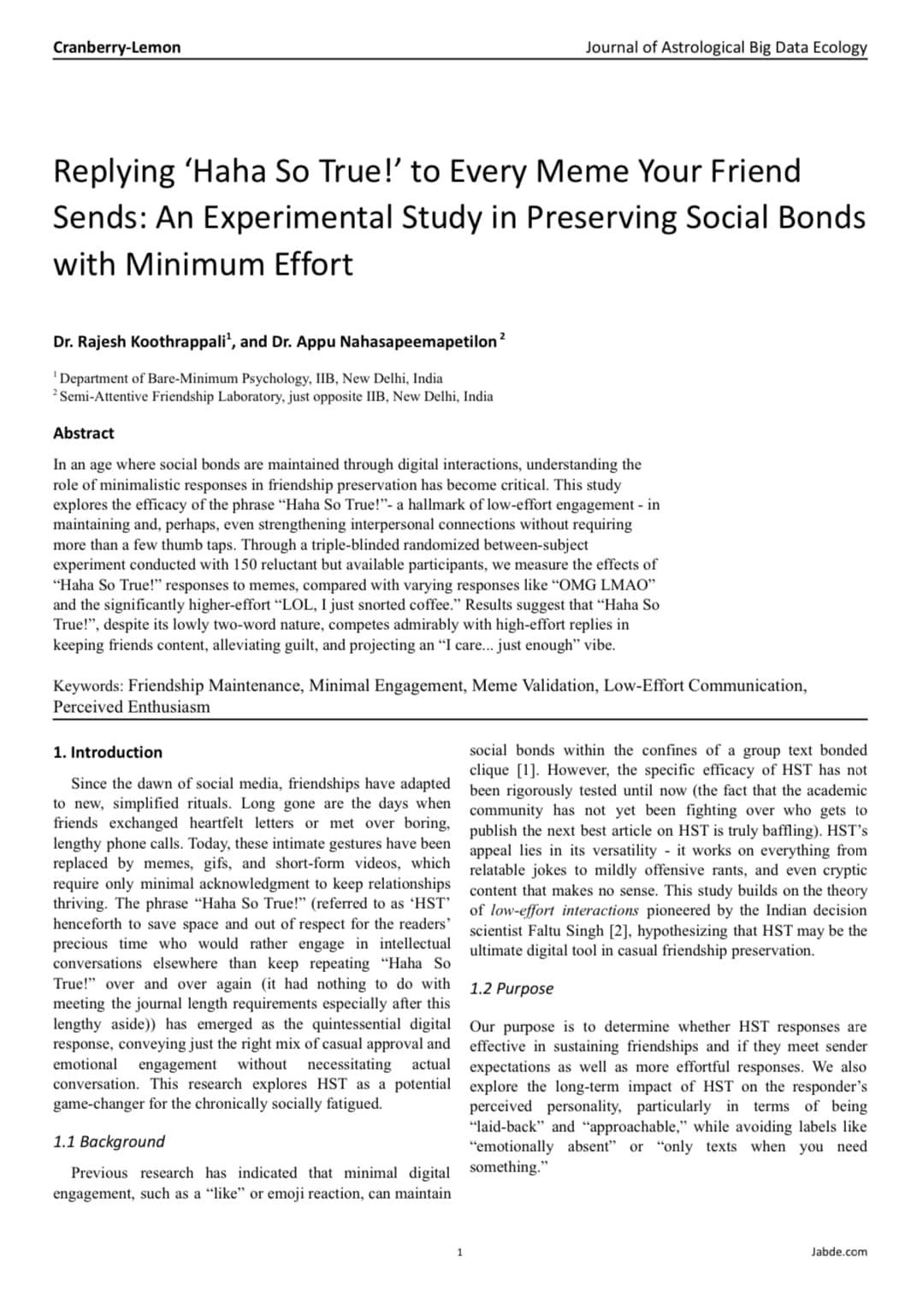
This is slowly being replaced by 👍ing or ❤️ing the message. No actual words needed.
❤️
👍
6(`A´)9
Nice
deleted by creator
I find that the variety of emotes people have available on discord say more than I probably would half-ass with words. At least with memes, if I’m having a conversation I will not be using emotes.
👌
Haha So True!
👍
Haha, glad I learnt of this parody journal. There’s also the Journal of Immaterial Science for anyone interested.
“Frankly, you brought this all on yourself” usually resolves it quickly, in my experience.
That sucks.
Hello, we’d like to offer you a position as police chief in a neighborhood that will statistically have a school shooting soon.
That sucks. Definitely push the last one. This happened to me one time in band camp
That sucks but this reminds me of…
…and that’s how I became king of the pirates, well anyways you should invest into my NFT cryptoAI trust me bro this gonna go to the moon!
Good thing he has three things to push all the buttons with…
“That’s rough, buddy” is my goto.
I’m more of a “well, shit” guy myself.
Empathize, “I can imagine how much that must have hurt, I’m sorry you had to deal with that”
“I can’t say I would’ve known what to do, had I been in your position.”
“I can only imagine what that must have been like for you, which understandably likely isn’t of much consolation to you.”
“It would be disingenuous of me to presume to know what it was like for you to have experienced what you endured, but I am happy to listen to what you have to say, if you wish to tell me.”
Or maybe ask what they need from you? Just a thought.
Whatcha want from me?
“That’s rough buddy.”
Thanks zuko
4: “I can help you hide the body if you want.”
That sucks.
“Stop trauma dumping on me, do I look like a licensed therapist?”
“that’s crazy”
“Cool story bro, did I ever tell you about that time I took an arrow to the knee?..”
deleted by creator
Tell a related story is best choice because it shows that you really feel what that person is coming through since you’ve came through similar situation yourself
that’s what neurodivergent people do to show sympathy - very often unknowingly. folks sometimes think we do that to get the attention for ourselves, but it’s just a long winded way of saying “i understand what you feel, you’re not alone in your pain”
I learned this a few years ago and my mind was blown because I’m autistic and this is indeed my instinct. I have also found that neurodivergent people are more likely to respond positively to an anecdote.
Neurotypical people tend to react better to “reflective listening” — basically the “it sucks” button, but more expanded. Like if someone is venting about something, I might say “That sounds really frustrating”, or similar. It feels like playing conversational ping pong where I’m not an active participant in the rally, but just reacting to my conversation partner’s shots.
I don’t tend to find reflective listening especially helpful if I’m the recipient of it (I cope with problems differently), so it blew my mind when I was trying to support a friend with these techniques and they ended the conversation by thanking me for the support, and they really needed that. It baffled me because I hadn’t felt like I’d said anything really at all, besides just reflecting stuff back at them, which felt sort of like small talk but even more superficial. But nah, turns out that different people find different kinds of support helpful. The_More_You_Know.jpg
Well you want to know the other person gets it, right? Otherwise it’s just hollow words. A well-chosen anecdote means that to some extent, you understand each other. I can see the appeal of that kind of commiseration.
But then you are making this about yourself. Stealing the show. Reaping all the sympathy.
When is only you and your friend in evening near the grill, then i don’t know which sympathy i stole, i mean men truly open up very rarely and often in very small circle or even only to one person, so you have to show some compassion in these moments
So you say the initial cry’s a show?
















